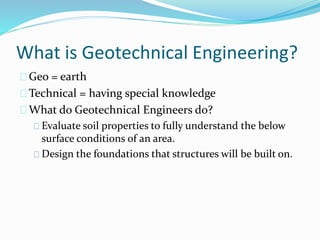6 Easy Facts About Geotheta Explained
6 Easy Facts About Geotheta Explained
Blog Article
The Of Geotheta
Table of ContentsThe Greatest Guide To GeothetaGeotheta - An Overview8 Simple Techniques For GeothetaThe Best Strategy To Use For GeothetaThe Main Principles Of Geotheta

They perform website examinations, accumulate examples, do research laboratory tests, and evaluate data to examine the viability of the ground for building and construction jobs - Geo Tech Engineering. Based upon their findings, geotechnical engineers offer referrals for structure layout, incline security, retaining frameworks, and mitigation of geotechnical hazards. They team up with other professionals, such as designers, architectural designers, and building teams, to make sure that geotechnical factors to consider are incorporated right into the total job style and execution
By evaluating the habits and residential or commercial properties of dirt and rock, they can determine potential geotechnical threats such as landslides, dirt settlement, or slope instability. Their expertise aids stop failings or mishaps that could threaten lives and property. Below are some thorough duties and duties of a geotechnical designer: Website Examination: Geotechnical designers conduct site examinations to gather data on subsurface conditions.
They translate the data to understand the homes and habits of the dirt and rock, including their toughness, leaks in the structure, compaction qualities, and groundwater problems. Geotechnical Analysis and Layout: Geotechnical designers examine the data gathered throughout site examinations to assess the stability and viability of the site for construction projects. They perform geotechnical computations and modeling to evaluate variables such as bearing capacity, negotiation, slope security, lateral earth stress, and groundwater circulation.
Getting My Geotheta To Work
Foundation Style: Geotechnical engineers play a crucial role in designing structures that can securely support the desired framework. They assess the soil conditions and lots requirements to establish the proper foundation kind, such as superficial structures (e.g., footings), deep structures (e.g (https://filesharingtalk.com/members/599923-geotheta)., piles), or specialized strategies like soil enhancement. They consider aspects such as settlement restrictions, bearing ability, and soil-structure interaction to create ideal structure designs
They examine building plans, display site tasks, and perform area examinations to validate that the layout referrals are adhered to. If unanticipated geotechnical problems emerge, they examine the scenario and give suggestions for removal or changes to the design. Danger Analysis and Reduction: Geotechnical engineers analyze geotechnical hazards and dangers linked with the job website, such as landslides, liquefaction, or dirt erosion.

Cooperation and Communication: Geotechnical designers work carefully with other professionals associated with a project, such as engineers, structural designers, and building teams. Reliable communication and cooperation are important to incorporate geotechnical considerations right into the general project style and building process. Geotechnical engineers supply technological expertise, answer queries, and ensure that geotechnical needs are met.
9 Simple Techniques For Geotheta
Right here are some kinds of geotechnical designers: Foundation Designer: Structure engineers focus on making and assessing structures for frameworks. They assess the soil problems, load needs, and website attributes to establish the most ideal foundation kind and layout, such as shallow structures, deep structures, or specialized techniques like pile structures.
They examine the variables influencing incline stability, such as dirt residential properties, groundwater problems, and slope geometry, and establish techniques to stop slope failures and reduce threats. Quake Designer: Earthquake engineers concentrate on evaluating and developing structures to endure seismic pressures. They assess the seismic risk of a website, assess soil liquefaction capacity, and create seismic layout criteria to make certain the safety and strength of structures throughout earthquakes.
They perform field screening, gather examples, and examine the collected data to define the dirt properties, geologic developments, and groundwater conditions at a site. Geotechnical Instrumentation Engineer: Geotechnical instrumentation designers concentrate on monitoring and determining the habits of soil, rock, and structures. They set up and maintain instrumentation systems that monitor aspects such as soil negotiation, groundwater levels, slope movements, and structural displacements to assess performance and give very early cautions of possible issues.
Geotheta Fundamentals Explained
They carry out examinations such as triaxial tests, consolidation examinations, straight shear tests, and permeability examinations to gather data for geotechnical analysis and design. Geosynthetics Engineer: Geosynthetics engineers specialize in the style and application of geosynthetic products, such as geotextiles, geogrids, and geomembranes. They use these products to enhance soil stability, reinforce inclines, supply drainage remedies, and control erosion.
They have a tendency to be investigative individuals, which implies they're intellectual, reflective, and curious. They are curious, methodical, rational, analytical, and logical. Some of them are additionally social, implying they're kind, generous, participating, patient, caring, useful, empathetic, skillful, and friendly - Consulting Engineer.
In the workplace atmosphere, geotechnical engineers use specialized software application devices to perform calculations, create styles, and analyze information. They prepare records, evaluation task specs, interact with clients and employee, and coordinate task pop over here tasks. The office setup supplies a helpful atmosphere for research study, evaluation, and partnership with various other specialists entailed in the task.
Geotheta Can Be Fun For Anyone
They regularly go to job sites to carry out site investigations, examine geotechnical conditions, and gather information for evaluation. These visits involve taking a trip to different areas, occasionally in remote or tough surfaces. Geotechnical designers might perform soil sampling, conduct tests, and screen building tasks to guarantee that the geotechnical aspects of the task are being executed appropriately.
Geotechnical engineers additionally work in specialized geotechnical labs. Geotechnical laboratory engineers function thoroughly in these environments, dealing with screening equipment, operating instruments, and tape-recording information.
Report this page